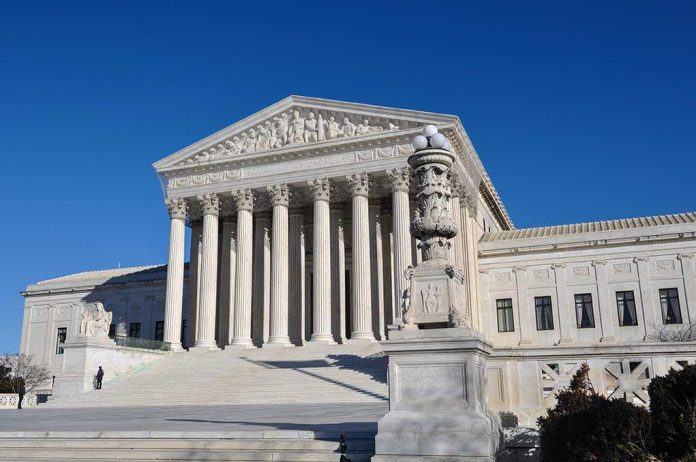
One county clerk’s refusal to sign marriage licenses could trigger a Supreme Court showdown that shakes the foundation of American marriage law for millions—leaving everyone wondering whose rights are truly protected when personal faith collides with federal mandates.
Story Snapshot
- The Supreme Court is considering Kim Davis’s appeal, challenging marriage equality and religious liberty boundaries.
- Davis’s case asks the Court to revisit the landmark Obergefell v. Hodges decision legalizing same-sex marriage.
- Lower courts ruled against Davis, awarding damages to couples denied licenses.
- The outcome could redefine the rights of public officials versus those of same-sex couples nationwide.
Clerk’s Defiant Stand: How Kim Davis Became a Flashpoint
Kim Davis, once a little-known county clerk in Rowan County, Kentucky, found herself thrust into the national spotlight after the Supreme Court’s 2015 Obergefell v. Hodges ruling legalized same-sex marriage across America. Davis refused to issue marriage licenses to same-sex couples, citing deeply held religious beliefs. Her actions sparked outrage, lawsuits, and eventually, her brief stint in jail for contempt of court. This was not a quiet protest; it was a public standoff that tested the limits of religious liberty for government officials and ignited a debate that still echoes through courtrooms and living rooms nationwide.
The ensuing legal battle culminated in lower courts awarding damages to the couples Davis had turned away. The heart of Davis’s appeal now lies not only in her claim to qualified immunity but in her legal team’s bold request: asking the Supreme Court to re-examine Obergefell itself. This move raises the stakes far beyond her personal liability and sets the stage for a potential redefinition of marriage equality in America.
Supreme Court’s Deliberation: What’s Really at Stake?
The Supreme Court is scheduled to consider Davis’s petition for review on November 7, 2025, a date that could mark a turning point for both religious liberty and LGBTQ+ rights. The justices must decide whether to limit their review to Davis’s immunity or to reopen the broader constitutional question of same-sex marriage. Legal experts caution that while the case is narrowly focused and unlikely to overturn Obergefell outright, the current conservative-leaning Court makes even “unlikely” outcomes worth watching.
Advocacy groups on both sides are bracing for impact. LGBTQ+ organizations warn that any move to revisit Obergefell could destabilize marriage rights and related legal benefits for same-sex couples. Religious liberty advocates argue that Davis’s stance represents the right of public officials to act according to conscience. Caught in the crossfire are millions of Americans whose marriages—and legal identities—depend on the outcome.
Ripple Effects: Anxiety, Mobilization, and Legal Uncertainty
The short-term consequence of this case is palpable anxiety among LGBTQ+ communities and their allies. Couples who once thought marriage equality was settled law now face renewed uncertainty. Beyond personal impact, the stakes reach into the very machinery of government; state and local officials responsible for issuing marriage licenses are watching closely, aware that a ruling could force them to navigate conflicting mandates.
Politically, the case is fueling mobilization around Supreme Court appointments and decisions. Conservative groups see an opportunity to press for greater religious liberty protections, while progressive organizations rally to defend Obergefell and the broader gains of the past decade. The legal, economic, and social ripple effects—touching family law, healthcare, and employment—could be profound if the Court opens the door for states to challenge marriage equality again.
Expert Analysis: Narrow Case, Broad Fears
Legal scholars and advocacy leaders generally agree that the Supreme Court rarely uses narrow cases like Davis’s to overturn major precedents. GLAD Law’s legal director points out that the issue before the Court centers on damages and immunity, not directly on marriage rights. However, experts also acknowledge that the current judicial climate is unpredictable, and the anxieties voiced by LGBTQ+ advocates are not unfounded.
SCOTUSblog’s analysis underscores the Court’s discretion: justices can choose to confine their review to the specifics or address larger constitutional questions if they see fit. Even a limited ruling could have unintended consequences, signaling a willingness to revisit established rights or emboldening future challenges. The consensus: while the odds of a direct reversal remain low, the mere consideration of Davis’s petition is enough to reignite the debate over whose liberties take precedence in the American legal system.
Sources:
The Advocate: Kim Davis SCOTUS Case Explained
SCOTUSblog: Court to consider whether to hear challenge to same-sex marriage on Nov 7
GLAD Law: Kim Davis Supreme Court Petition




